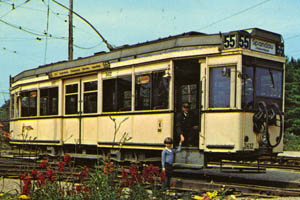
- Description
- Center entrance tram
- Secondary Use
- None
- Type
- City and Suburban Streetcars
- Year
- 1927
- Retired from Service
- 1967
- Acquired by the Museum
- 1973
- Note
- Seashore cannot easily operate No. 3412 because the car’s long wheelbase will not negotiate sharp curves on open trackwork.
- Fund
- 532
Berliner Verkehrs-Betriebe 3412
From Berlin
History
Lichterfield, a suburb of Berlin, is the site of the world’s first commercially successful electric tram line, built in 1881 by Werner von Siemens, predating by seven years America’s first successful electric trolley in Richmond, VA. Berlin completed electrifying its trams in 1910 and became one of the world’s largest systems. No. 3412 is one of a large group of Class TM 36 center entrance, single truck trams built in 1927 for the Berliner Strassenbahn (Berlin Tramway). No. 3412 is an unusually long, single-truck car typical of European trams built between the World Wars. It was designed for the narrow streets of older European cities. In 1929, the Berlin Tramway was reorganized as the municipally owned Berliner Verkehrs-Betriebe (BVG). The BVG rebuilt No. 3412 in the 1930s to operate either as a single ended single unit or as part of a back to back train with another similar car. Complicated controllers and heavy jumper cables enabled the paired cars to operate without special multiple unit equipment.
No. 3412 survived the air raids of World War II. After the partition of Berlin following the war, No. 3412 operated in West Berlin. Tram service in West Berlin ended in 1967, although trams in East Berlin have continued operating to the present.
In 1968, the Berlin transit administration (BVG) donated No. 3412 to Seashore. Seashore acquired the car as part of its Great World Capitals Collection. In 1969, the car traveled through East Germany by canal boat to reach Hamburg in West Germany. Hamburg’s tram system stored No. 3412 for four years until Seashore could raise funds to ship the tram to the U.S. Finally, in 1973, Seashore secured a bargain shipping rate from Atlantic Container Lines. ACL placed No. 3412 on a lowboy trailer and pulled it onto its Roll On/Roll Off ship American Song, traveling from Bremen, Germany to Port Elizabeth, NJ. No. 3412 arrived in good condition and operated at the museum. Seashore had acquired another German tram, Hamburg No. 2710, in 1965.
Technical Information
- Seats: 26
- Control: NXFB2 Form23
- Brakes: Dynamic/Hand
- Compressor: none
Trucks
- Number: 1
Motor
- Number: 2
- Manufacturer: USL
- Model: 271V
Weight and Dimensions
- Length: 38’ 4.00"
- Width: 7’ 3.00"
- Height: 12’ 8.00"
- Weight: 26400 lbs.
© 1998 - 2025 New England Electric Railway Historical Society. All Rights Reserved.